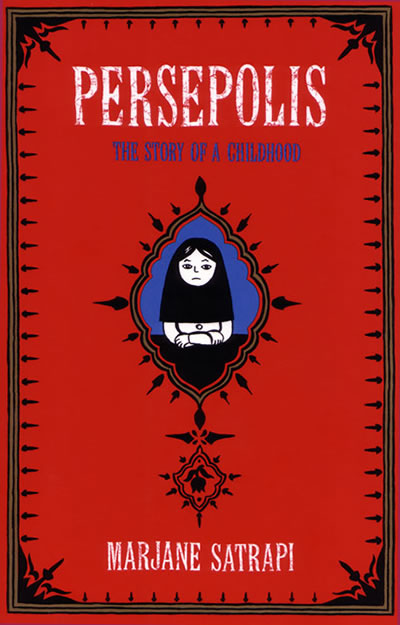BY KIMBERLY BENNETT & MINDY ALLEN
Editor-in-Chief & Assistant Editor

Since 1998, McKendree University has invited renowned speakers for the George E. McCammon Memorial Distinguished Speaker Series which is held every year. In the past, the Hettenhausen Center for the Arts opened its floors to well-known people such as the founder of the nonprofit organization, To Write Love on Her Arms: Jamie Tworkowski as well as actor and Associate Director of the White House Office of Public Engagement (Obama Administration): Kal Penn. Each year, McKendree University invites people who make differences in our world to share their experiences with the McKendree Community. Monday, Oct. 27, Marjane Satrapi – award winning author of the graphic novel, Persepolis – visited the campus, allowing herself to be open to an exclusive Q&A session before her public interview session in The Hett.
Her graphic novel, Persepolis, is a two-volume, autobiographical young-adult series about Satrapi’s childhood, focusing mainly on her traumas during the Islamic Revolution. The autobiography has received great amounts of praise according to Random House, and it is also considered a San Francisco Chronicle and Los Angeles Times Best-seller.
In both her exclusive and public interviews, Satrapi discussed her most recent project, placing her as director of an upcoming movie, The Voices, starring Ryan Reynolds and Anna Kendrick. IMDB describes the storyline of the upcoming movie:
“Jerry (Ryan Reynolds) is that chipper guy clocking the nine-to-five at a bathtub factory, with the offbeat charm of anyone who could use a few friends. With the help of his court-appointed psychiatrist, he pursues his office crush (Gemma Arterton). However, the relationship takes a sudden, murderous turn after she stands him up for a date. Guided by his evil talking cat and benevolent talking dog, Jerry must decide whether to keep striving for normalcy, or indulge in a much more sinister path.”
Peter Palermo, the Artistic Director of the Hett, organized both a secluded Q&A panel as well as a panel that was opened to the rest of the McKendree community. Unlike the usual format where the distinguished speakers give lectures to the audiences, Palermo switched the layout up a bit and decided to also ask Satrapi questions in front of the public much like the way students and faculty members were able to ask Satrapi questions during the secluded panel. The panel format gave Satrapi a chance to answer selectively instead of forcing her to come up with a 45 minute lecture about her life. Certain students and faculty members were able to have extra time to ask questions before the main event so Satrapi could answer or clarify any questions they may have developed when reading one of the many copies of the novel that Palermo distributed to everyone who attended the private Q&A. Some English majors and students who read Persepolis in their Young Adult literature class a few years ago, taught by Martha Patterson, Ph.D., attended both panels and were greatly satisfied with Satrapi’s answers and stories.

Brittney Scott, a senior at McKendree, explained her surprise after listening to Satrapi: “She uses a lot of humor in her book, but she was more hilarious than I ever expected. There were times she brought tears to my eyes because I was laughing so hard. But most of all, I was surprised by how relatable she was. I never would have guessed I’d have so much in common with her. I didn’t realize that it was that big of a deal to speak about what happened when I read the book. It obviously took a lot of courage to publish the book knowing she’d never be able to go back.”
Professors and students of the Humanities division showed great interest in Satrapi’s visit and made a strong appearance for both of the panels.
Martha Patterson, Ph.D., professor of English, strongly influences all of her students – as well as the rest of the McKendree community – to be aware of the world around them. She helped organize the private Q&A event with Palermo and could not thank the Hett enough for hosting such a remarkable event.
“Marjane Satrapi is an internationally celebrated writer, artist, and filmmaker working today,” Dr. Patterson notes. “As she tells her story in Persepolis of growing up during the Iranian Revolution, the Iran-Iraq war, and of living in exile in Europe, she reminds her audience of the humanity and aspirations of the Iranian people. Her work is especially important given how tense the U.S. relationship has been with Iran; in 2002 President George W. Bush labeled Iran part of the “Axis of Evil aiming to threaten peace in the world.””
Dr. Patterson, as well as others who attended the Q&A sessions, was surprised at how realistically Satrapi viewed the world. “I thoroughly enjoyed hearing her. I was moved by how friendly, funny, and engaging she was and how her commitment to political and social equality shaped her commitment to treat famous actresses and her housekeeper with the same respect” Dr. Patterson explained.
Nichole DeWall, Ph.D., one of McKendree’s professors of English, was just one of the many faculty members who attended the event.
“The Q&A session was a wonderful opportunity to have a more intimate conversation with Satrapi.” Dr. DeWall said, describing her overall impression of the event, “It’s not every day that students get to exchange ideas with an internationally-renowned artist. The session was made all the more meaningful by Hett Artistic Director Peter Palermo, who distributed copies of Persepolis before Satrapi’s arrival. Students were better able to ask informed and substantive questions during the Q & A because they had read the graphic novel beforehand. Mr. Palermo also screened the film Persepolis in the Hett in advance of Satrapi’s arrival; this screening prepared our students even further.”
Dr. DeWall strongly believes McKendree University should invite more speakers like Satrapi because their presences “greatly improves the intellectual climate of our campus community” and their visits encourage students to be historically and culturally aware of the world around them.
In general, Dr. DeWall greatly enjoyed everything Satrapi had to offer. “In addition to being a talented and courageous artist,” Dr. DeWall said, “Ms. Satrapi was incredibly colorful and dynamic – and hilarious! I thought the interview format of her Hett event was better able to showcase her personality than a traditional talk would have.”
Satrapi was open to all questions during both panels and gave realistic responses; she was down-to-earth and could not get away with answering a question without adding some humoristic flair to her answers. For example: “I read in an article the other day that the butt forms first before anything else. So, in all actuality, we are all buttholes. Each and every one of us are considered buttholes. So the next time someone calls you a butthole, just say, ‘Actually, you are right. You’re a butthole too.’”